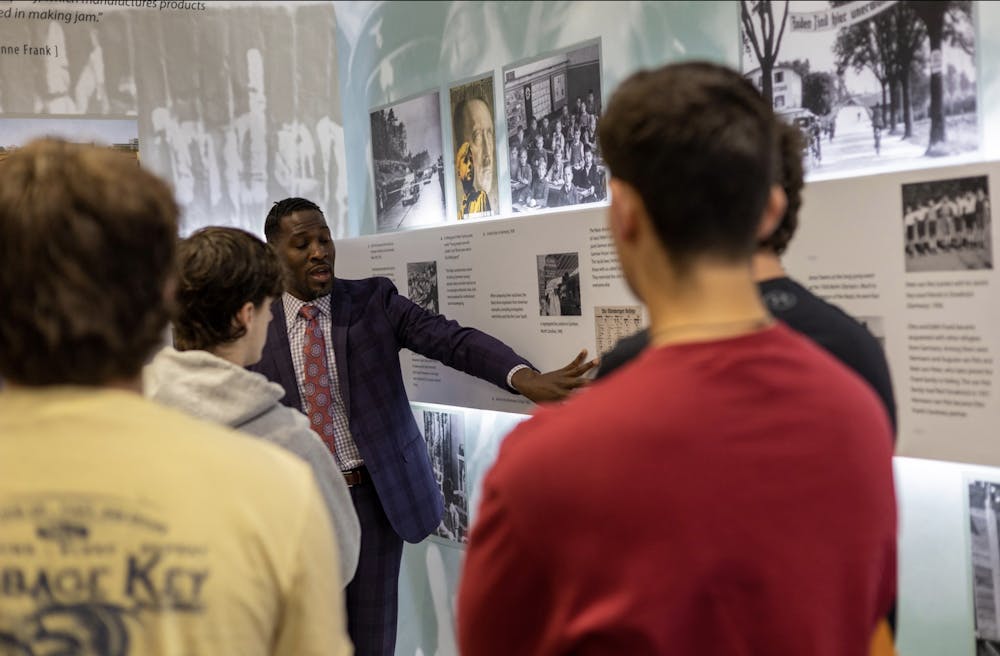The Office of Campus Life will bring a traveling exhibit from the Anne Frank Center to American University’s Bender Library after spring break to educate students on the life and legacy of Anne Frank.
Students met virtually for an interest meeting on Feb. 2 led by Amanda Taylor, AU’s assistant vice president of diversity, equity and inclusion, where they discussed the importance of Holocaust education with the University of South Carolina’s Anne Frank Center team.
USC is the official U.S. partner of the Anne Frank House in Amsterdam and the only partner site in North America. USC’s campus is home to the Anne Frank Center, a permanent four-room exhibit sharing Anne Frank’s story through quotes, photos, video and original artifacts. The traveling exhibits can be found in locations across the U.S.
“What really struck me about this particular opportunity … is the way it really situates the story of the Holocaust, that is really the story of the emergence of antisemitism,” Taylor said during the event.
The traveling exhibit, scheduled to come to AU after spring break and stay until the end of spring 2023, includes docent-led tours for students, staff and visitors and docent training, per the Anne Frank Center’s website. Morgan Bailey, the director of educational programs and outreach for the Anne Frank Center, said the program aims to help students facilitate a “deep dive into history,” improve presentation and public speaking skills and understand the modern-day implications of the Holocaust.
The University is partnering with USC’s Anne Frank Center team to train student guides for the coming traveling exhibit. Bailey said the program centers peer education rather than having experts lead tour groups.
During the event, Bailey said Anne Frank’s father, Otto, realized his daughter’s maturity and wisdom beyond her years after reading her diary and wanted to share Anne’s writing with others, which informs the Anne Frank Center’s decision to center the voices of young people.
“We operate in what we call peer education …” Bailey said during the event. “[We] don’t have experts come in and lecture at your student body; we work with representatives from the student body to put them in positions of leadership to have these conversations with one another.”
The USC exhibit is not only intended for college students, but the mostly student-led tours are also open to individuals, families or groups of up to 100 people. During the meeting, Claire Mattes, a junior at USC, said being a tour guide for the past year and a half has been rewarding.
“I hope that [the exhibit] has an impact on people and reaches the people that it needs to reach …” Mattes said. “It’s [non-Jewish people] who need to learn this, it’s people who don’t necessarily either know about Anne or really care, or people who have antisemitic thoughts that they might not have ever thought were antisemitic. Those are the people I hope it reaches and I think it’s easier to reach those people through student activism.”
Mattes said leading tours of freshmen was “intriguing” due to their gaps in Holocaust education.
“It amazed me how many students didn’t know that Anne had passed [during] the Holocaust,” Mattes said during the event. “A few said, ‘I didn’t know Anne didn’t survive,’ or ‘I didn’t know Otto was the only survivor,’ and it was kind of eye-opening to see what was missing from education.”
The training program aims to help students comfortably discuss complex issues and help their peers understand difficult histories such as the Holocaust. Campus Life staff members are seeking 15 to 20 AU students to be trained by USC leaders to become peer guides, according to Taylor.
“We’re looking for students who are deeply committed to the work of addressing antisemitism and racism and bigotry in all of its forms and are open to engaging with their peers in these conversations,” Taylor told The Eagle. “And we’re looking for students from lots of different schools at AU, different years at AU, different majors, different clubs and [organizations], different social identities and lived experiences.”
Sophie Ridlon, a senior in the School of Public Affairs and the College of Arts and Sciences, is among the students looking to apply for the peer guide position. She said she hopes this new exhibit will have positive effects on campus.
“The peer-to-peer aspect is really interesting and will hopefully foster more conversations,” Ridlon said, adding that this new addition will expose students to the lasting impacts of antisemitism still felt today and how it relates to Jim Crow laws and present-day racism.
Taylor added that educating students about antisemitism and the Holocaust should not fall on Jewish students alone.
“One of the most powerful ways we learn is through each other,” Taylor said.
This article was edited by Mackenzie Konjoyan, Jordan Young and Nina Heller. Copyediting done by Isabelle Kravis, Stella Guzik, Luna Jinks, Sarah Clayton and Leta Lattin.
Editor's note: A previous version of this story referred the Anne Frank Center of Mutual Respect. The name of the story has been updated to reflect that it is now called the Anne Frank Center.





